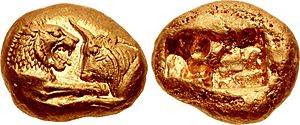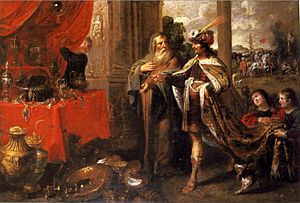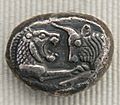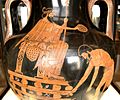Croesus facts for kids
Quick facts for kids Croesus |
|
|---|---|
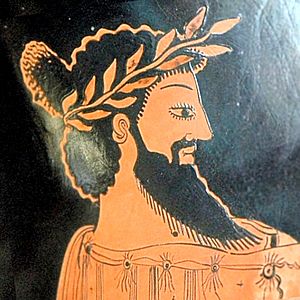
A picture of Croesus from an ancient Greek vase (around 500–490 BC)
|
|
| King of Lydia | |
| Reign | c. 585 – c. 546 BC |
| Predecessor | Alyattes of Lydia |
| Successor | Cyrus II of Persia |
| Born | 7th/6th century BCE Lydia Kingdom |
| Died | 6th century BCE Sardis, Turkey |
| Issue | Atys |
| Lydian | 𐤨𐤭𐤬𐤥𐤦𐤮𐤠𐤮 (Krowiśaś) |
| Father | Alyattes of Lydia |
Croesus (/ˈkriːsəs/ KREE-səs) was a very famous king of Lydia, an ancient kingdom in what is now Turkey. He ruled from about 585 BC until he was defeated by the Persian king Cyrus the Great in 547 or 546 BC. Croesus was known for being incredibly rich. People even today use the phrase "rich as Croesus" to describe someone with a lot of money.
Ancient historians like Herodotus wrote about Croesus's amazing wealth. He gave many valuable gifts to the Delphi oracle, a special place where people sought advice from the gods. Croesus's story, especially his defeat, became a very important event for the Greeks, helping them remember key moments in history.
Contents
Croesus: The Rich King of Lydia
Who Was Croesus?
Croesus was the last king of the Mermnad dynasty in Lydia. He ruled for about 14 years. His name in his own language, Lydian, was Krowiśaś, which meant "The noble Karoś." The Greeks later called him Kroisos, and that's where the Latin and English name "Croesus" comes from.
Croesus's Early Life and Rise to Power
Croesus was born around 620 BC. His father was King Alyattes of Lydia. Croesus had a sister named Aryenis and a step-brother named Pantaleon. Before becoming king, Croesus was a governor in a city called Adramyttium. His father had rebuilt this city to help fight against the Cimmerians, a nomadic group who had attacked Lydia before.
When his father Alyattes died in 585 BC, Croesus and his step-brother Pantaleon fought to become the next king. Croesus won this struggle and became the new ruler of Lydia.
Expanding the Lydian Empire
Once Croesus became king, he quickly started to expand his kingdom.
Conquering Greek Cities
Croesus first attacked the Greek city of Ephesus. The ruler of Ephesus, Pindar, was actually Croesus's nephew. Pindar had supported Croesus's step-brother, so Croesus pressured him to leave the city. After Pindar left, Croesus took over Ephesus. He even helped rebuild the famous Temple of Artemis there, donating many marble columns.
He continued to conquer other Greek cities along the coast of Asia Minor, including Ionia, Aeolis, and Doris. However, he decided not to conquer the Greek islands. Instead, he made friends with them, which helped Lydia trade with Egypt at a city called Naucratis.
Ruling Over Other Lands
Lydia had already taken control of Phrygia under Croesus's father. This region was important for its goods and roads. Croesus continued to rule Phrygia, allowing local leaders to stay in power as long as they supported him and sometimes paid tribute.
Croesus also brought Caria under his direct control. His own mother was from Caria, and this region had long been allied with the Lydian kings. According to the historian Herodotus, Croesus ruled over many different peoples west of the Halys River. This included the Lydians, Phrygians, Carians, and various Greek groups.
Friends and Allies
Croesus kept up the good relationships his father had made with other powerful kingdoms.
Gifts to Delphi
Croesus continued the tradition of his ancestors by having good relations with the sanctuary of the god Apollo in Delphi, Greece. He sent many rich gifts to Delphi, including a huge golden lion. In return, the Lydians received special privileges, like being able to ask the oracle for advice first and being exempt from taxes.
Making Friends with Sparta
Croesus also made friends with the powerful Greek city-state of Sparta. He even gave them gold to decorate a statue of Apollo, after the Delphi oracle told them to get gold from him. This alliance would become important later.
The First Gold Coins
Croesus is famous for being the first king to issue true gold coins that were very pure and used by everyone. His father, Alyattes, had already invented coins using electrum, a natural mix of gold and silver. The gold for these coins came from the Pactolus river, which flowed through the Lydian capital, Sardis. This river was even linked to the myth of King Midas, who supposedly washed away his golden touch there.
Because of his wealth, Croesus's name became a symbol for a very rich person. Even today, people say "rich as Croesus" to mean someone is extremely wealthy.
Croesus and Solon: A Lesson in Happiness
A famous story, told by Herodotus, describes a meeting between Croesus and the wise Greek thinker Solon. Croesus, proud of his immense wealth and believing himself to be the happiest man, asked Solon who he thought was the happiest person in the world.
Solon's answer surprised Croesus. Solon named three people who were happier:
- Tellus, an Athenian who died bravely fighting for his country.
- The brothers Kleobis and Biton, who died peacefully in their sleep after showing great devotion to their mother.
Solon explained that true happiness cannot be judged until a person's life is over, because fortune can change quickly. This story teaches that wealth alone does not guarantee happiness, and that life can be unpredictable. Croesus's own life soon proved Solon right.
The War with Persia
In 550 BC, Croesus's brother-in-law, King Astyages of Media, was overthrown by his own grandson, the Persian king Cyrus the Great. This event worried Croesus.
The Oracle's Warning
Croesus decided to ask the oracle of Delphi for advice. The oracle told him that if he attacked Cyrus, he would "destroy a great empire." Croesus thought this meant he would destroy Cyrus's empire, so he felt confident. He also allied with Sparta, believing them to be the strongest Greeks.
The Final Battle
Croesus attacked a city called Pteria, which was a vassal state to Lydia. Cyrus responded by attacking the Lydians at Pteria. Croesus was defeated in this first battle. He then burned Pteria to prevent Cyrus from using it and returned to his capital, Sardis.
However, Cyrus followed him. The Lydian army was defeated again at a place called Thymbra. Cyrus then laid siege to Sardis, eventually capturing the city. This defeat ended the rule of the Mermnad dynasty and the Lydian Empire. Lydia never regained its independence and became part of the Persian Empire.
What Happened to Croesus?
What happened to Croesus after his defeat is not entirely clear. In many stories, Cyrus decided to keep Croesus alive and even made him his advisor. Some accounts say that Croesus was taken to Hyperborea by the god Zeus, or that he became a governor in Media.
There is also a story that Croesus was put on a burning pyre (a pile of wood for burning). However, many historians believe this part of the story might have been made up by the Greeks, perhaps inspired by the fires that broke out in Sardis when the Persians captured it. Most evidence suggests that Cyrus the Great did not kill Croesus.
Croesus's Lasting Legacy
After defeating Croesus, Cyrus adopted the use of gold coins for his own Persian Empire. These coins, known as "croesids," continued to be used for some time until Darius the Great replaced them with new Persian coins called "darics." Croesus's invention of standardized gold coinage was a very important step in the history of money.
His name remains a symbol of immense wealth, and his story with Solon continues to teach lessons about the true meaning of happiness and the changing nature of fortune.
Images for kids
-
Aesop in front of Croesus
See also
 In Spanish: Creso para niños
In Spanish: Creso para niños
- Croesus (opera)
- Karun Treasure ("Croesus treasure")
 | Mary Eliza Mahoney |
 | Susie King Taylor |
 | Ida Gray |
 | Eliza Ann Grier |


